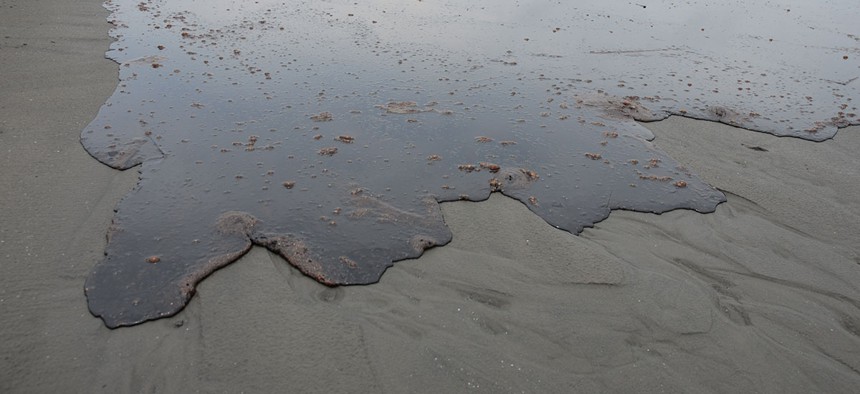
Oil approaches the Louisiana shore in 2010 after the spill. Louisiana's Governor's Office
BP Will Pay $18.7 Billion In Damages to the Government for 2010 Oil Spill
The case stands as the largest environmental settlement in history.
Five years after millions of gallons of oil flooded into the Gulf of Mexico, BP has reached a settlement with the federal government and five gulf states to pay a record $18.7 billion in environmental and economic damages caused by the spill.
Louisiana Attorney General Buddy Caldwell announced the settlement at a press conference on Thursday calling it "the largest environmental settlement in history."
BP will dole out $7.1 billion to Louisiana, Alabama, Florida, Mississippi, Texas and the federal government over the course of 15 years for environmental damages. The company will pay a $5.5 billion civil penalty to the U.S. government under the Clean Water Act, the largest penalty ever extracted under the law. $4.9 billion will be paid out to the five gulf states to settle economic damages over an 18-year period. Finally, BP has also agreed to dole out an additional $1 billion to several hundred local government entities seeking damages from the spill.
The agreement has been concluded following negotiations with the five gulf states and the Department of Justice and has not yet been legally finalized. It is years in the making and seeks to mitigate damages caused by the largest oil spill in U.S. history. 11 workers died in April 2010 as the result of an explosion on the BP-leased drillship the Deepwater Horizon in the Gulf of Mexico. The blast caused a massive spill of crude oil, which choked wildlife and animals and washed up on beaches. It took BP 87 days to stop the flood of oil into the Gulf. The catastrophe sent shockwaves through U.S. energy policy and regulation that are still being felt today.
"Five years ago we committed to restore the Gulf economy and environment and we have worked ever since to deliver on that promise," said BP chairman Carl-Henric Svanberg. "We have made significant progress, and with this agreement we provide a path to closure for BP and the Gulf. It resolves the company's largest remaining legal exposures, provides clarity on costs and creates certainty of payment for all parties involved.
"The Justice Department has been fully committed to holding BP accountable, to achieving justice for the American people and to restoring the environment and the economy of the Gulf region at the expense of those responsible and not the American taxpayer," U.S. Attorney General Loretta Lynch said in a statement following the announcement.
In January 2013, BP agreed to pay the Justice Department $4 billion after the company plead guilty to 14 criminal charges conncted to the spill.
The Gulf spill prompted the Obama administration to completely overhaul the Interior Department's long-troubled offshore energy branch that critics including the agency's inspector general called too cozy with the oil industry that it regulated.
Interior issued several new drilling safety policies and regulations in the months and years after the explosion. That process remains ongoing with the issuance of draft rules earlier this year setting new standards for subsea blowout preventers, a device meant as a last line of defense against runaway wells that failed to contain the supture of BP's Macondo well.

Interior also separated energy leasing, environmental oversight and revenue collection functions to help avoid what the administration concluded were inherent conflicts of interest in what was then called the Minerals Management Service.
It also led the Obama administration to scale back plans to widen offshore development. Months after the spill, the White House backed off plans announced weeks before the accident to sell drilling leases off the coasts of mid-Atlantic and South Atlantic states in the 2012-2017 offshore oil-and-gas leasing plan. A draft 2017-2022 plan issued months ago, however, does include some Atlantic Coast leasing.
The disaster quickly spilled into Beltway politics.
It produced an instantly famous political moment in mid-June of 2010. Texas Republican Joe Barton, at a House hearing, apologized to BP's then-CEO Tony Hayward for what Barton called a "shakedown" by the White House, which had reached a deal with BP for the company to create a $20 billion fund for victims' damage claims. The comment became fodder for White House and Democratic attacks over the GOP's allegiance with the industry.
A moratorium on deepwater drilling that President Obama imposed after the accident drew strong pushback from Gulf State lawmakers, and GOP accusations that Obama was stifling energy development and the region's oil-dependent economy.
The pace of drilling permits once the ban was lifted became the stuff of public political battles between Republicans and Michael Bromwich, the former Justice Department official brought in to oversee the drilling regulation overhaul. The drilling halt and slowdown did contribute to a drop in Gulf of Mexico oil production, but it has since rebounded to pre-spill levels.






